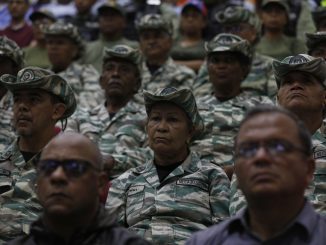
U.S. President Donald Trump greets German Chancellor Friedrich Merz at the White House in Washington on June 5, 2025. Madalina Vasiliu/The Epoch Times
| Published June 5, 2025
The president said the Russia–Ukraine fighting might escalate because there’s a ‘lot of hatred’ between the two sides.
President Donald Trump hosted German Chancellor Friedrich Merz at the White House, where discussions centered on the ongoing Russia–Ukraine conflict and broader transatlantic relations.
During the meeting, President Trump acknowledged that a peace deal between Russia and Ukraine might not be imminent, suggesting that the conflict may need to continue before diplomacy can succeed. He disclosed a recent conversation with Russian President Vladimir Putin, who indicated plans to retaliate against Ukraine for a drone strike. Although Trump has previously claimed he could end the war quickly, he now concedes that more fighting may occur before peace is achievable.
Chancellor Merz emphasized the importance of U.S. leadership in resolving the conflict and advocated for renewed U.S. sanctions against Russia, aligning with European efforts to pressure Moscow. The visit also aimed to bolster transatlantic ties, with discussions on trade cooperation and greater U.S. support for NATO. Germany plans to increase military spending significantly amid wider European rearmament initiatives.
The meeting highlighted the complexities of the Russia–Ukraine war and the challenges in achieving a diplomatic resolution. While President Trump expressed a desire for peace, his remarks suggest that a prolonged conflict may be necessary before a viable peace agreement can be reached. Chancellor Merz’s visit underscores Europe’s reliance on U.S. engagement and the ongoing efforts to strengthen NATO and transatlantic relations in the face of geopolitical tensions.
The joint developments from Trump’s meeting with German Chancellor Friedrich Merz and his remarks on Russia and Ukraine carry several important implications:
1. Shift in Trump’s Peace Narrative
Trump’s acknowledgment that “more fighting may need to happen” before peace is possible marks a shift from his earlier stance that he could end the Russia–Ukraine war “in 24 hours.” This signals a more pragmatic or strategic approach—or reflects the realities of unresolved tensions between Moscow and Kyiv.
2. Transatlantic Alignment or Divergence
Chancellor Merz’s push for stronger U.S. sanctions and NATO leadership suggests that Europe still views the U.S. as essential to managing the conflict. However, if Trump’s approach becomes less interventionist, a potential policy gap could emerge between the U.S. and EU on how to handle Russia.
3. Putin–Trump Communications Raise Questions
Trump’s disclosure of telling Putin not to retaliate after a Ukrainian drone strike hints at continued direct communication with the Russian leader. This raises questions about unofficial diplomacy and how Trump may manage U.S.–Russia relations outside formal State Department channels.
4. NATO and European Military Spending
Germany’s military buildup and renewed NATO focus reflect a broader European response to Russian aggression, but also a recognition that Trump may condition U.S. defense support on European investment—consistent with his “fair share” rhetoric.
5. Signals to Global Markets and Diplomacy
Talk of prolonged conflict could affect defense markets, energy prices, and international diplomatic efforts. A drawn-out war may also complicate future peace talks and leave other global powers (like China) room to influence outcomes.
Overall Takeaway:
While President Trump still voices support for ending the Russia–Ukraine war, he now signals that a longer conflict may be unavoidable before peace is realistic. His comments, combined with talks with German Chancellor Friedrich Merz, suggest a more cautious and strategic U.S. stance—balancing diplomacy with geopolitical leverage.
At the same time, Europe is looking to Washington for leadership and deeper NATO coordination, but Trump’s evolving tone hints that future U.S. engagement might come with stricter conditions and fewer guarantees of immediate intervention.
SOURCE: THE EPOCH TIMES – Trump Says Russia, Ukraine May Have to ‘Keep Fighting’ Before They’re Ready For Peace
THE WALL STREET JOURNAL – Trump Says Russia and Ukraine May Need to ‘Keep Fighting’ Before Making Peace
THE AUSTRALIAN – Russia, Ukraine may need to ‘keep fighting’ before making peace: Trump





Be the first to comment